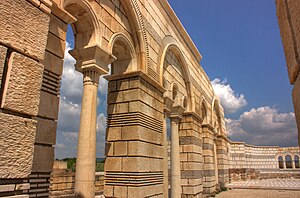Battle of Pliska
| Battle of Pliska | |||||||
|---|---|---|---|---|---|---|---|
| Part of the Byzantine–Bulgarian Wars | |||||||
 Ruins of Pliska |
|||||||
|
|||||||
| Belligerents | |||||||
| Bulgarian Empire | Byzantine Empire | ||||||
| Commanders and leaders | |||||||
| Krum | Nikephoros I † | ||||||
| Strength | |||||||
| 62,000 (uncertain) | 60,000–80,000 (estimated) | ||||||
| Casualties and losses | |||||||
| Unknown | almost the whole army, including the emperor | ||||||
The Battle of Pliska or Battle of Vărbitsa Pass was a series of battles between troops, gathered from all parts of the Byzantine Empire, led by the Emperor Nicephorus I Genik, and Bulgaria, governed by Khan Krum. The Byzantines plundered and burned the Bulgar capital Pliska which gave time for the Bulgarians to block passes in the Balkan Mountains that served as exits out of Bulgaria. The final battle took place on 26 July 811, in some of the passes in the eastern part of the Balkans, most probably the Vărbitsa Pass. There, the Bulgarians used the tactics of ambush and surprise night attacks to effectively trap and immobilize the Byzantine forces, thus annihilating almost the whole army, including the Emperor. After the battle, Krum encased Nicephorus's skull in silver, and used it as a cup for wine-drinking. This is one of the best documented instances of the custom of the skull cup.
The Battle of Pliska was one of the worst defeats in Byzantine history. It deterred Byzantine rulers from sending their troops north of the Balkans for more than 150 years afterwards, which increased the influence and spread of the Bulgarians to the west and south of the Balkan Peninsula, resulting in a great territorial enlargement of the First Bulgarian Empire.
When Nicephorus I became emperor in 802, he planned to reincorporate Bulgar-held territory back into the empire. In 807 he launched a campaign but only reached Odrin and achieved nothing because of a conspiracy in his capital. That attempted attack, however, gave reason for the Bulgar Khan Krum to undertake military operations against the Byzantine Empire. The main objective was an extension to the south and south-west. In the next year a Bulgar army penetrated the Struma Valley and defeated the Byzantines. The Bulgar troops captured 1,100 litres (roughly 332 to 348 kilograms) of gold and killed many enemy soldiers including all strategoi and most of the commanders. In 809 the Khan personally besieged the strong fortress of Serdica and seized the city, killing the whole garrison of 6,000.
...
Wikipedia
